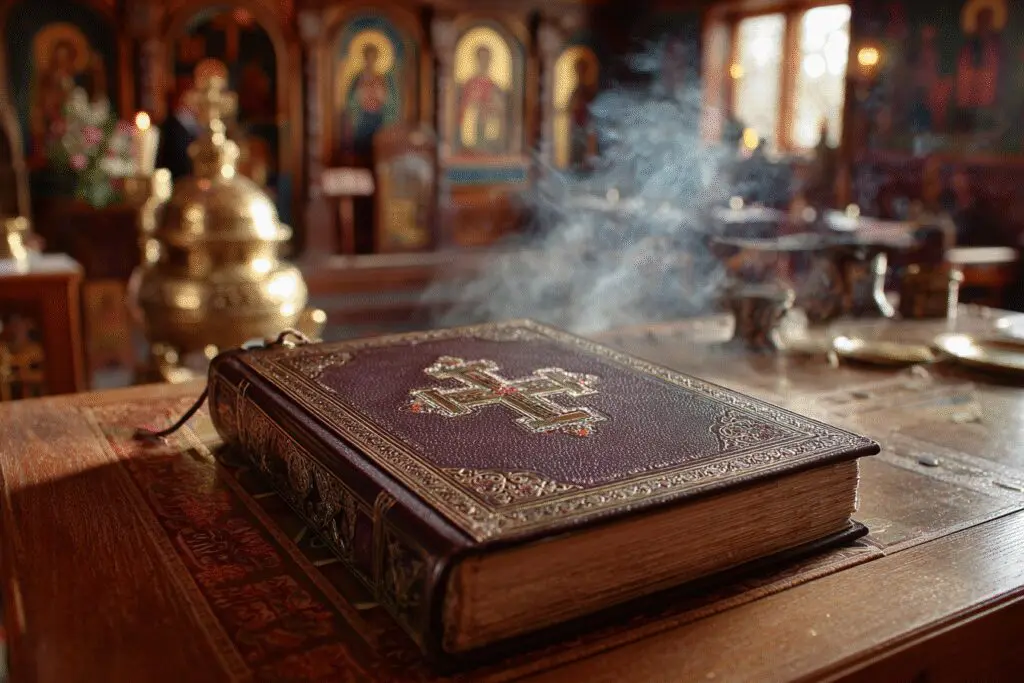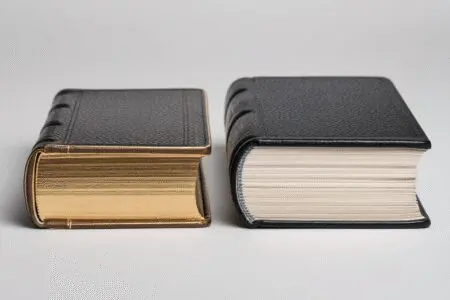Ever walk into a bookstore and see the massive wall of Bibles? It’s a lot. You’ve got dozens of translations, study Bibles, teen Bibles, journaling Bibles… it’s overwhelming. But I noticed something a while back. They’re almost all categorized as “Protestant” or “Catholic.” It got me thinking, what Bible do Eastern Orthodox use? It seems like a simple question, but the answer is way more interesting than I expected.
It’s not as simple as pointing to one single book, like a “King James Version for the Orthodox.” The Orthodox Church has a different perspective on scripture, a different history, and even a different list of books in its Old Testament. It’s a tradition that traces its roots back to the very first Christian communities, and their Bible reflects that ancient history.
More in Bible Category
What Did Jesus Say About the Bible
Is the Bible Fiction or Nonfiction
Key Takeaways
- The Eastern Orthodox Church’s Old Testament is based on the Septuagint, the ancient Greek translation of the Hebrew scriptures. This is the version most quoted by the Apostles in the New Testament.
- The Orthodox Old Testament includes several books not found in the Protestant Old Testament, often called the “Apocrypha.” Orthodox Christians refer to them as the Anagignoskomena.
- There isn’t one single “official” English translation for the entire Orthodox Church. The original Greek (for both the Septuagint and the New Testament) is the authoritative text.
- For English speakers, the most popular and comprehensive choice is the Orthodox Study Bible, which uses a new translation of the Septuagint for the Old Testament.
So, They Have a Different Old Testament? Why?
Yeah, this was the first big surprise for me. I always assumed the Old Testament was, well, the Old Testament. But the version used in the Eastern Orthodox Church is based on something called the Septuagint.
I remember talking to a friend about this, and my eyes kind of glazed over when he said “Septuagint.” It sounds like a complex theological term, but the concept is actually pretty straightforward.
Around 300 BC, long before Jesus was born, there was a huge Jewish community in Alexandria, Egypt, who spoke Greek, not Hebrew. They needed the scriptures in their own language. So, a team of scholars translated the Hebrew texts into Greek. This translation became known as the Septuagint (often abbreviated as LXX).
Here’s the kicker: When the Apostles and early Christians wrote the New Testament, they were living in a Greek-speaking world. When they quoted the Old Testament, they overwhelmingly quoted from the Septuagint. It was the Bible of the early Church. The Orthodox Church simply continues to use the Old Testament that the first Christians used.
Wait, That Makes Sense. So Why Do Other Bibles Use a Different Old Testament?
This is where history gets a little complicated. The Protestant Reformation in the 16th century took a different approach. The Reformers wanted to go ad fontes—back to the sources. For the Old Testament, they decided the original source was the Hebrew Masoretic Text, not the Greek Septuagint translation.
The Masoretic Text is a later collection of Hebrew scriptures compiled by Jewish scribes between the 7th and 10th centuries AD. It doesn’t include some of the books that were in the Septuagint. So, when the Protestant Bibles were being translated, they based their Old Testament on this Hebrew collection, which is why it’s shorter.
The Orthodox Church basically said, “Thanks, but no thanks. We’ll stick with the version the Apostles used.”
What Are These “Extra” Books in the Orthodox Bible?
You’ll often hear these books called the “Apocrypha,” which is a word that kind of means “hidden things.” It sounds a bit mysterious and untrustworthy, and frankly, Orthodox Christians don’t love the term. They prefer the name Anagignoskomena, which means “worthy of being read.”
These aren’t “new” books; they were part of the scriptural tradition of the Church for centuries. They just got cut from other canons for the historical reasons we just talked about.
Some of these books include:
- Tobit
- Judith
- 1, 2, 3, & 4 Maccabees (Protestant Bibles with an “Apocrypha” section usually only include 1 & 2)
- The Wisdom of Solomon
- Sirach (also called Ecclesiasticus)
- Baruch
- The Letter of Jeremiah
- Additions to Daniel and Esther
I tried reading a few of them, and it’s fascinating stuff. The books of Maccabees, for example, give you all the history of the Hanukkah story. It fills in a lot of the historical gap between the last prophets and the New Testament.
Are They as Important as Genesis or Isaiah?
That’s a great question, and the Orthodox approach is a bit different. They don’t have a rigid “canon within the canon” like some other traditions might. All of scripture is seen as God-inspired.
However, they are used differently in worship. You’ll hear Genesis read during Lent and the Psalms are chanted constantly, but you might not hear a reading from 4 Maccabees during a Sunday service very often. They are part of the heritage and are considered valuable for wisdom and understanding God’s work in history, but the focus remains on the Gospels, Psalms, and the Prophets.
Is There One “Official” Orthodox Bible I Can Buy?
This is the second big surprise. You’d think a church so focused on tradition would have one single, official, mandated Bible translation. But it doesn’t quite work that way.
The “official” text of the Church is the original language text.
- For the Old Testament, that’s the Greek Septuagint.
- For the New Testament, it’s the Koine Greek text, specifically the Patriarchal Text of 1904, which is the official text of the Ecumenical Patriarchate of Constantinople.
The Church’s priority is preserving this original text. Translations are seen as necessary tools for people to understand scripture, but they are not the source text itself. Different national Orthodox Churches (Russian, Greek, Serbian, etc.) have approved translations in their own languages.
So, What Do English-Speaking Orthodox Christians Use?
For a long, long time, this was a real problem. There wasn’t a complete, reliable English translation of the Orthodox Bible. People had to get creative. They would often use a King James Version and then buy a separate printing of the “Apocrypha” and just kind of piece it all together. It wasn’t ideal.
That all changed in 2008 with the publication of the Orthodox Study Bible.
This was a massive project. For the Old Testament, the translators didn’t just borrow an existing translation; they made a fresh translation directly from the Septuagint. The New Testament text they used is the New King James Version, which is a solid, traditional translation.
But the real value is in the study notes. The commentary is drawn entirely from the early Church Fathers—Athanasius, Basil the Great, John Chrysostom, etc. It’s like reading the Bible alongside the ancient Christians who lived and breathed this stuff. It gives you a completely different perspective.
You can learn more about the Septuagint’s history and significance from academic sources like the Septuagint Institute at Trinity Western University.
How Does the Orthodox Church Actually Use the Bible?
Here’s where things really diverge from what I was used to. In many Protestant churches, the Bible is primarily a book for personal study. You read it, you analyze it, you have a “quiet time” with it. While Orthodox Christians certainly read and study their Bibles personally, that’s not its primary context.
The Bible’s home is in the liturgy—the worship of the Church.
Think about it this way: the scriptures are not just a collection of historical documents or a rulebook. They are living, active words that are meant to be prayed, chanted, and experienced within the community of faith. During an Orthodox service, the entire space is filled with scripture.
- The hymns are almost entirely scripture.
- The priest’s prayers are woven from scriptural verses.
- The walls are covered with icons depicting biblical scenes.
- The Gospel book itself is treated with immense reverence, carried in procession, and enthroned on the altar table.
The Bible isn’t just something they read; it’s something they inhabit. It’s part of the air they breathe during worship. This liturgical context shapes how they understand everything. It’s not about pulling out a single verse to prove a point; it’s about immersing yourself in the grand story of salvation as the Church has experienced it for 2,000 years.
What Does That Mean for Me, Just Trying to Read It?
It means reading it with a different mindset. I tried this myself. Instead of opening the Orthodox Study Bible and just trying to blast through a few chapters, I slowed down. I read the commentary from the Church Fathers. It stopped being just an information download.
I started to see connections I never had before. The notes would point out how a verse in Isaiah predicted a scene in the Gospels, and how that is commemorated in a specific hymn sung on a particular feast day. It’s like a web of connections, with everything pointing to Christ.
It also means that for the Orthodox, the Bible is never separated from Holy Tradition. Tradition isn’t a bad word; it’s the lived experience of the Holy Spirit in the Church throughout history. The Bible is the pinnacle of that Tradition, but it’s interpreted within it, not apart from it.
The Final Word
So, what Bible do Eastern Orthodox use? They use the Bible of the early Christians. An Old Testament based on the Greek Septuagint, which includes the books the Apostles read, and a New Testament that is read, chanted, and prayed in the context of a living, ancient worship tradition.
If you’re an English speaker looking to explore this, the Orthodox Study Bible is your best starting point. It’s the most complete and accessible resource out there.
It’s been a journey for me to figure all this out, and I’m still learning. But it’s given me a new appreciation for the Bible. It’s not a static book from the past, but a deep well of life that flows through the Church. It’s more than just words on a page; it’s an invitation into a story that is still unfolding.
Frequently Asked Questions – What Bible Do Eastern Orthodox Use

What is the relationship between Holy Tradition and the Orthodox interpretation of the Bible?
Orthodox Christianity teaches that the Bible is best understood in the context of Holy Tradition, which includes the teachings of the Church Fathers, church councils, hymns, and saints’ lives. This tradition guides the interpretation of scripture and prevents individual misinterpretation.
How is the Bible incorporated into worship and life in the Eastern Orthodox Church?
In the Orthodox Church, the Bible is central to worship through readings of the Gospels, Epistles, and Psalms during services. It is regarded as a living book that forms part of the Church’s liturgy, prayers, and hymns, and is understood within Holy Tradition.
What books are included in the Orthodox Old Testament that are not found in Protestant Bibles?
The Orthodox Old Testament includes additional books known as the Anagignoskomena, such as Tobit, Judith, 1, 2, and 3 Maccabees, the Wisdom of Solomon, Sirach, Baruch, and parts of Daniel and Esther, making it longer than the Protestant Old Testament.
Why does the Orthodox Church use the Septuagint rather than the Hebrew Masoretic Text for their Old Testament?
The Orthodox Church prefers the Septuagint because it was the version used by the early Christians and the Apostles, and it is based on older Hebrew texts. Additionally, many New Testament quotations from the Old Testament are taken from the Septuagint, which the Church considers more aligned with their faith and tradition.
What specific version of the Bible is used by most Eastern Orthodox Christians in English?
Most Eastern Orthodox Christians who speak English use the Orthodox Study Bible, which features the Old Testament translated from the Greek Septuagint and the New Testament based on the Textus Receptus, along with study notes from early Church Fathers.



